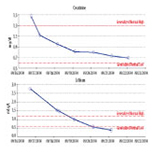Severe Acute-on-Chronic Lithium Intoxication Treated Successfully with Conservative Management
Marco Bustamante, Yasmin Sabet, Emmanuel Rodriguez, Carlos E. Rodriguez-Castro
Med Sci Case Rep 2014; 1:43-46
DOI: 10.12659/MSCR.892935
Available online: 2014-11-15
Published: 2014-11-15

Background:
Lithium is used as the mainstay of treatment for bipolar disorder. However, its narrow therapeutic range and many factors that influence its metabolism may easily lead to lithium toxicity. Toxicity can present with gastrointestinal symptoms such as diarrhea, nausea, vomiting, and neurologic symptoms such as tremors, coma, ataxia, slurred speech, and seizures. Chronic lithium ingestion has also been associated with a variety of renal diseases, particularly nephrogenic diabetes insipidus (NDI) and, less frequently, chronic tubulointerstitial nephropathy.
The etiology of lithium toxicity is often multifactorial and classified as acute, acute-on-chronic, and chronic. The selection of treatment – normal saline IV infusion versus hemodialysis – depends on clinical status, etiology, and classification of the intoxication. In this report we present a case of severe acute-on-chronic lithium toxicity that responded adequately to conservative treatment.
Case Report:
A 74-year-old female with past medical history of diabetes mellitus, arterial hypertension, recurrent urinary tract infections, and bipolar disorder presented with a 1-month history of progressively worsening lethargy and generalized weakness, associated with upper bilateral extremity tremors, mild ataxia, and a 1-week history of diarrhea. Laboratory results demonstrated asymptomatic bacteriuria, acute kidney injury, and increased lithium levels. Despite the acute kidney injury and the presence of neurological symptoms, normal saline IV infusion was preferred over hemodialysis and resulted in complete resolution of symptoms and acute kidney injury upon discharge.
Conclusions:
Decision of treatment is based on clinical and laboratory data. The guidelines for treatment demonstrate variability in the diverse settings of lithium intoxication. In this case, the decision of normal saline IV infusion was controversial because the Psychiatry service recommended hemodialysis in the setting of acute kidney injury and sub-acute onset neurological symptoms with a concern for permanent neurological sequelae. However, with this management, the neurological symptoms resolved completely and kidney function returned to normal.
Keywords: Lithium Carbonate, Toxic Actions





